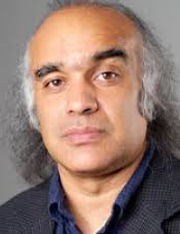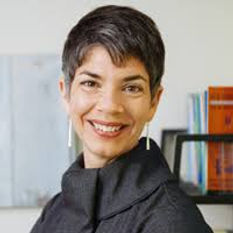


The Distinguished Scholar Speaker Series in Critical Pedagogy brings together leading thinkers to explore the development of critical pedagogies and the mobilization of teaching and learning practices towards matters of democracy, social justice, agency, politics, power, culture, and community. Click an image or scroll down to view talks.
Aviva Chomsky: Multiculturalism, Political Correctness, and the Left: A Search for Common Ground
February 9, 2017
This presentation will look at how ideas about cultural politics and class politics have clashed in recent years. From the corporate world to politics to the university, debates about social justice have asked whether and how identity politics and challenges to capitalism intertwine. Corporations, universities, and politicians like Hillary Clinton have embraced “diversity” while trying to separate it from a critique of how the economic system functions. Bernie Sanders’ class-based political project was accused of paying insufficient attention to race, gender, and other forms of diversity. What’s going on, and what can we do about it?
Donaldo Macedo: The Ethics of Linguistic Democracy in Schools and Societies
March 31, 2016
Donaldo Macedo will discuss the contradiction that often surfaces when liberal educators feel threatened by the legitimacy of a subordinate group’s struggle—a struggle that may not include them and demands that their liberal treatment of oppression be translated into concrete political action. Macedo will argue for the need to embrace a Freirean humanistic pedagogy designed to develop structures so that excluded linguistic communities can take their own initiative and chart their own course of action, thus eliminating the need for outside liberal and conservative educators’ continued colonialism through English only paradigms that often results in the suffocation of other languages.
Antonia Darder: Schooling the Flesh: The Body, Pedagogy, and Inequality
March 2, 2016
This lecture will address the politics of classroom life and the relationship between the body and the social and material processes of constructing knowledge. Key principles of a ‘critical pedagogy of the body’ are elaborated through an examination of dominant ideologies, educational practices, and questions of inequality. This work is presented as necessary for decolonizing the body within educational settings, and the transformation of educational practice. The lecture draws on essays on the body in “A Dissident Voice: Essays on Culture, Pedagogy, and Power”---a collection of essays that engages a variety of political questions rooted within the contentious terrain of culture and power.
Deborah Britzman: Melanie Klein, Early Analysis, and the Question of Freedom
January 27, 2016
Deborah Britzman’s lecture will introduce the psychoanalyst Melanie Klein and her theories of mental life as an emotional situation, through to problems of self/other relations in our own time. The case is made for Klein’s relevance and the difficulties her theories pose to the activities of learning and pedagogical relations. The lecture will develop the following questions: Why is learning an emotional situation? How did Klein’s life and larger history influence her views? What are her central theories of mental life? Why did Klein focus on anxiety and phantasies as making up the life of the mind? What is object relations theory? And what does Klein’s model of the self proffer to contemporary education in schools and in universities?
Brad Evans: Intolerable Violence
November 18, 2015
As fundamental questions of what it is to live and learn are increasingly filtered through aesthetic regimes of mediated suffering, such daily spectacles of violence equally reveal the bio-political contours of late liberal rule. This raises critical questions regarding both modes of representation and alternative pedagogies in our insecure times. Not least of which includes the question of how human subjects are educated to tolerate certain representations of violence produced amongst the manufactured simulacrum of media technologies and how, under such conditions, countering accepted states of normalized terror is fundamentally connected to questions of pedagogy and education in the twenty-first century.
Joel Westheimer: No Child Left Thinking: Testing, Accountability and the Threat to Democratic Life
October 21, 2015
Our cultural obsession with standards and accountability have had dramatic effects on what is and isn't taught in Canadian and American classrooms. As teachers’ hands are tied to test preparation, students' opportunities to develop the skills of critical thinking that are so vital for any democratic society are severely constrained. This presentation details what we can do about it, how critical pedagogy can be used to challenge a neoliberal education agenda, and how we can restore both sanity to the classroom and dignity and professionalism to teaching.
Henry Giroux: Where is the Outrage? Critical Pedagogy in Dark Times
October 22, 2015
Henry Giroux’s lecture addresses the larger corporate and market driven forces now shaping all aspects of education, politics, culture, and everyday life in North America. In this talk, there will be a special emphasis on the role that critical pedagogy plays in defining not only traditional spheres of schooling but also a crucial form of public pedagogy that is at the heart of contemporary politics. In this sense, Giroux’s lecture explores what might be called the educative nature of culture and politics. At the same time, the lecture considers a number of related educative and pedagogical concerns central to the field of critical pedagogy including the notion of teachers as public intellectuals, pedagogy and the project of a substantive democracy, a politics of responsibility, and finally, pedagogy as a form of resistance and educated hope.
Sut Jhally: Beyond the Ivory Tower: Cultural Politics and Public Pedagogy
March 18, 2015
During his lecture, Jhally reflected on the curious absence of resources dedicated to the development of critical pedagogies in the university – this, despite the fact that teaching remains a primary function assigned both to academics and the mission of the university more broadly. Why is it, Jhally asked, that teaching and learning still receives so little attention when it occupies such a large proportion of academic labour?

The McMaster Centre for Scholarship in the Public Interest (MCSPI) Speaker Series aims to foster research excellence in areas of pressing cultural, political, social, and ecological concern by exploring the consequences of human innovation and change, while providing opportunities for collaborative and transdisciplinary insight, critical and creative thinking, and meaningful public engagement to be integrated as core dimensions of academic pedagogy and practice in the 21st century. Click an image or scroll down to view talks.
Ronald Deibert
Ronald J. Deibert: The Geopolitics of Cyberspace
November 13, 2014
Deibert’s lecture will consider the global control of information and how state and non-state actors are contesting the newly evolving terrain of global digital-electronic-telecommunications.
Dorothy Roberts: Fatal Invention: The New Biopolitics of Race
October 23, 2014
In her talk, Roberts examined the myth of the biological concept of race - revived by purportedly cutting-edge science, race-specific drugs, genetic testing, and DNA databases - continues to undermine a just society and promote inequality in a supposedly "post-racial" era.
Michael Hardt: The Poors, the Multitude, and the Commons -- A Conversation with Andrew Rszitnyk
February 7, 2014
Playing Three-Dimensional Chess in the Age of Empire: An Interview with Michael Hardt.
Michael Hardt: Multitudes in Revolt, from Tahrir to Taksim [Q&A]
February 6, 2014
Questions following Michael Hardt's talk.
Michael Hardt: Multitudes in Revolt, from Tahrir to Taksim
February 6, 2014
Hardt will be giving a lecture titled “Multitudes in Revolt, from Tahrir to Taksim” that considers how a cycle of struggles characterized by occupations and encampments have spread through different parts of the world in the last three years. The talk aims to grasp the importance of these global struggles and to recognize the primary challenges they face, investigating in particular the role of organization and leadership in these “leaderless” movements.
Brad Evans: Youth as the Object of Power
July 22, 2013
Brad Evans opens up a discussion behind the “war” in the war on youth and what he calls the death of the future.
Kenneth J. Saltman: Neoliberalism and Corporate School Reform: 'Failure' and 'Creative Destruction'
July 22, 2013
Kenneth Saltman discusses the connections between corporate school reform and the economic and ideological elements of neoliberal restructuring. He analyzes the discourses of “failure” and “creative destruction” behind corporate school reform.
Erika Shaker: Scapegoating Youth in the War on Progress
July 19, 2013
Erika Shaker formulates a critique that she calls the “war on progress.” She discusses how this war is being waged, with what effect, and how political and media elites play a role in perpetuating illusions about it.
David Theo Goldberg: Neoliberalizing Race
July 17, 2013
David Theo Goldberg’s talk takes a historical view of the relationship between neoliberalism and race, beginning with the post-WW2 period.
Douglas Kellner: Youth, Media Spectacle, and New Media
July 16, 2013
Douglas Kellner addresses the various political and social implications of ubiquitous media spectacles.
Henry A. Giroux: The Violence of Organized Forgetting
July 15, 2013
Henry Giroux’s talk tackles the widespread culture of violence, historical amnesia, and social death in the United States—and the implications for democracy itself.
Angela Y. Davis: 150 Years Later: Abolition in the 21st Century: A Challenge for Public Intellectuals
March 27, 2013
Having helped to popularize the notion of a "prison industrial complex," Angela Davis now urges her audiences to think seriously about the future possibility of a world without prisons and to help forge a 21st century abolitionist movement.
Christopher Newfield: Ruin and Rebirth in the Public University: How We Can Avoid Decline
December 20, 2011
Christopher Newfield examines the loss of confidence in the university as a public institution and the fractured relationship between the university and society.




















